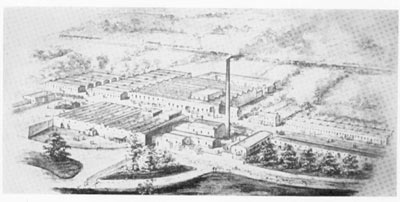
The Religious Society of Friends (Quakers) in Ireland
Quakers in Business in Ireland

The SS William Penn, ready for launch, Waterford
The types of business, and the names of some of the Irish Quaker families that owned and ran them, make interesting reading.
- Banking – Hoare, Pike, Newenham, Pim
- Milling – Shackleton, Grubb, Goodbody, Davis
- Engineering – Jacob, Grubb, Edmundson, Wigham
- Shipbuilding and owning – White, Malcomson, Beale, Pim, Pike, Lecky, Richardson. Walpole, Bewley
- Linen, Cotton, and Jute spinning and manufacturing – Malcomson, Richardson, Goodbody, Douglas, Allen, Walpole
- Cut glass – Penrose, Gatchell, White
- Jam manufacturing – Lamb
- Structural steel – Pearson
- Railways – Pim, Haughton
- Tobacco – Goodbody
- Brewing – Strangman
- Cafes – Roberts, Bewley,Goodbody
- Biscuits – Jacob, Marsh

The Goodbody Factory, Clara, Co. Offaly.
Why were Friends successful in this way? Modern business has become so competitive, and the profit motive so pervasive, that it is hard to imagine the strong influence their religious convictions exerted on them. They simply believed it was right to offer a good product for a fixed, and reasonable, price. They believed in honesty and integrity in all their dealings. A simple life-style, and not over-extending themselves financially, allowed them to build up their resources. Strict rules governing business methods for members meant that they were increasingly trusted with money, and some became bankers. Various laws, including those related to swearing oaths, prevented Friends from attending university and joining the professions for a couple of centuries, so they put their energies into business instead. Friends were good employers, and this led to a loyal workforce.

Bessbrook Damask Linen piece, commemorating Penn's Treaty with Native Americans
Also, and importantly, the structure of The Society of Friends from its earliest days, with a system of representatives from Meetings regularly visiting other Meetings, often in other parts of the country, created a network of relationships between like minded individuals and families. It was natural, therefore, that they would hear about, support, participate in and emulate each other's ventures.
See also Notable Irish Quaker Firms and Books.